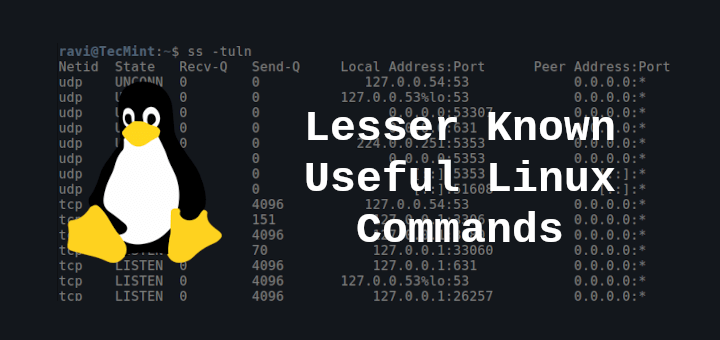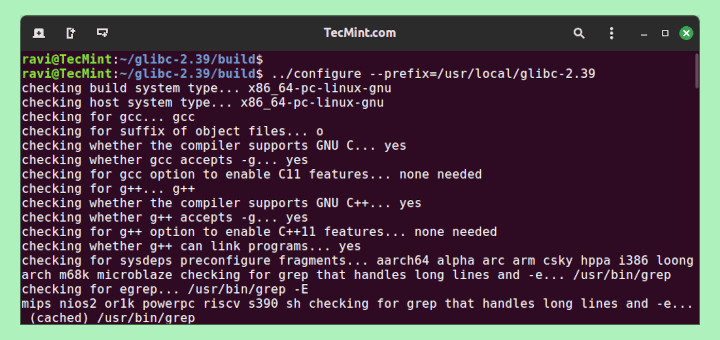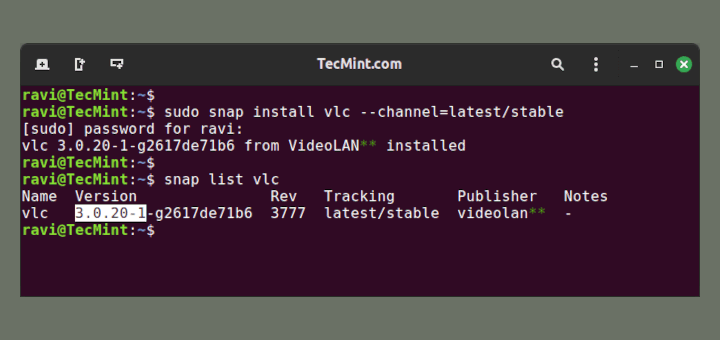In our previous article, we have covered some useful command line networking utilities for Sysadmin’s for network management, troubleshooting and debugging on Linux. We mentioned some networking commands that are still included and supported in many Linux distributions, but are now, in reality, deprecated or obsoleted and therefore should be carry out in favor of more present-day replacements.
Although these networking tools/utilities are still available in official repositories of mainstream Linux distributions, but they do not actually come pre-installed by default.
This is evident in Enterprise Linux distributions, a number of popular networking commands no longer work on RHEL/CentOS 7, while they actually work on RHEL/CentOS 6. Latest Debian and Ubuntu releases don’t include them as well.
In this article, we will share deprecated Linux networking commands and their replacements. These commands include ifconfig, netstat, arp, iwconfig, iptunnel, nameif, as well as route.
All the listed programs with exception of iwconfig are found in the net-tools package which has not been under active maintenance for so many years.
Importantly, you should keep in mind that “unmaintained software is dangerous”, it poses a great security risk to your Linux system. The modern replacement for net-tools is iproute2 – an assortment of utilities for controlling TCP/IP networking in Linux.
The following table shows the summary of the exact deprecated commands and their replacements, that you should take note of.
| Linux Deprecated Commands | Linux Replacement Commands |
|---|---|
| arp | ip n (ip neighbor) |
| ifconfig | ip a (ip addr), ip link, ip -s (ip -stats) |
| iptunnel | ip tunnel |
| iwconfig | iw |
| nameif | ip link, ifrename |
| netstat | ss, ip route (for netstat -r), ip -s link (for netstat -i), ip maddr (for netstat -g) |
| route | ip r (ip route) |
You will find more details about some of the replacements in these following guides.
- ifconfig vs ip: What’s Difference and Comparing Network Configuration
- 10 Useful “IP” Commands to Configure Network Interfaces
Reference: Doug Vitale Tech Blog post.
Net-tools Project Home: https://sourceforge.net/projects/net-tools/
iproutre2 Description Page: https://wiki.linuxfoundation.org/networking/iproute2
All in all, it’s good to keep these changes in mind, as most of these obsolete tools will totally be replaced sometime in the future. Old habits die hard but you have to move on. In addition, installing and using unmaintained packages on your Linux system is an insecure and dangerous practice.
Are you still stuck to using these old/deprecated commands? How are you coping with the replacements? Share your thoughts with us via the feedback form below.








They are not obsolete – they are standard UNIX commands and are present in every BSD and UNIX distribution all the way back to the implementation of ARCNET and Ethernet in the early 1980’s. These new “ip” commands are just another package to do what we already do. Eliminating netstat, route, ifconfig, arp, and others to replace them with a new package is ludicrous. If the net-tools package on Linux is not maintained, then the clue phone is ringing and someone needs to wake up and pull it into the network core distribution.
I was at a UNIX developers conference in 1995. Most of the folks there were BSD UNIX folks, but there were a few early Linux folks there too. One of the guys was giving an overview of Linux when he showed the “routes” command, which essentially did that “netstat -rn” does.
When one of the folks at the conference asked why he did not use netstat to do that, the Linux guy asked what netstat was. The whole room broke up laughing. Needless to say, it did not help Linux’s reputation on that day.
Five years later, the “routes” command was gone from Linux and netstat was everywhere. I predict that this “ip” command they are pushing is going to meet the same ugly fate that the “routes” command met in the late 90’s. Change for change sake serves no practical purpose.
The issue is that you do not have a maintainer for net-tools. What makes you think you will have a maintainer for these new ip tools down the road? The problem is with maintaining a set of tools. Solve that, and you fix the problem. Why netstat, route, ifconfig, arp, ping, traceroute, and others are not currently a standard part of the Linux network kernel is baffling.
@Daves
You have shared the same sentiment as the other readers below, but from an experienced and well explained view. Many thanks for the feedback.
And who was the smart and expert that decided that they are, deprecated?
Exactly… Why reinvent the wheel? Yes, I’m old school.. Init works (ed) just fine!
Seriously, who decided that the old tools are outdated and depreciated?
Probably the same idiot that thought systemd was a step forward.
@Zamana
These tools are just considered obsolete, because the net-tools package has not been maintained for a so many years.
Yay, necro.
Not maintained means “not maintained” and nothing more, it is a probably net state of something that has worked fine for years, or decades, and doesn’t have any known bugs. That doesn’t make it automatically insecure or dangerous as the article author suggests, merely an unknown and potential risk at worst.
Honestly, I’m not sure why unmaintained software should necessarily lead to a whole new suite and renaming/removing a bunch of standard commands forcing everybody under the sun to relearn things they already know. They could have chosen to become the maintainers of net-tools and updated them OR they could at least have retained the syntax and a rough similarity in the naming.
@Jeremy
Many thanks for the useful feedback.